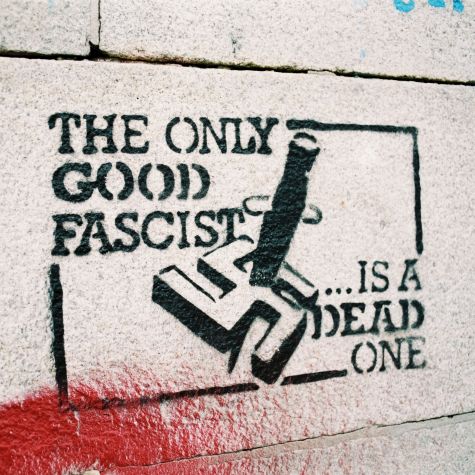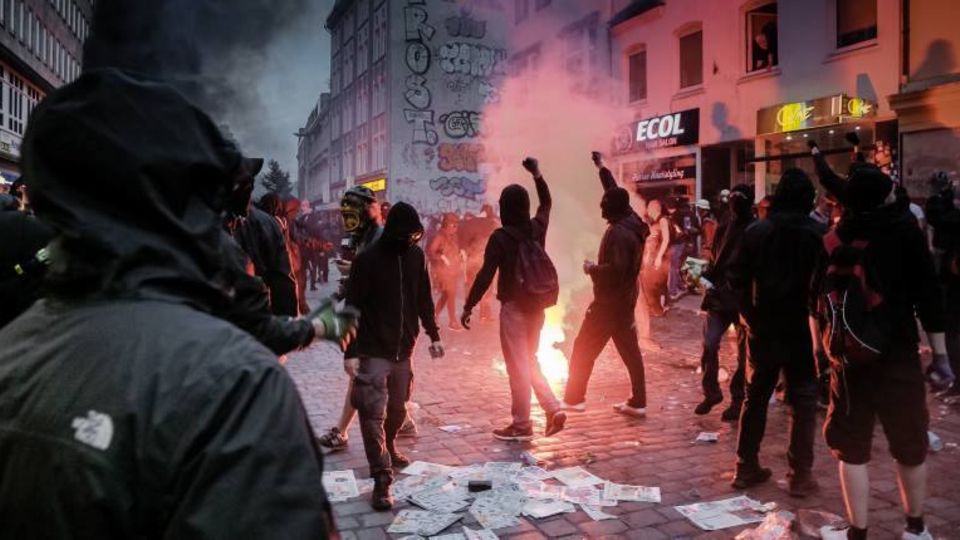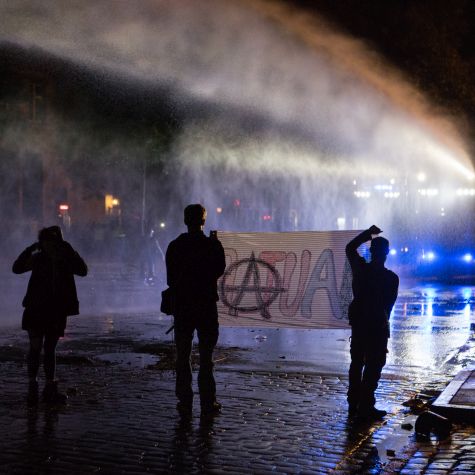Left-wing extremism

Left-wing extremism is a collective term for all efforts directed against the free democratic basic order that are based on treating the values of freedom and (social) equality as absolutes, especially as they are found in anarchist and communist ideas.
Left-wing extremist goals
Left-wing extremists seek to abolish the existing state and social order and thus the free democratic basic order. Depending on their ideological orientation, they want to replace it with a communist system or an anarchist society “free of domination”. All left-wing extremists agree that “capitalism” as the “root of all evil” has to be fought and eliminated.
Left-wing extremists regard “capitalism” as the inseparable union of the market-based system of ownership and the democratic state governed by the rule of law. The sole purpose of this union, they say, is to consolidate relations of exploitation and oppression. This is why they consider “capitalism” to be incompatible with the idea of a society that is based on freedom and equality for all people.
Left-wing extremists believe that overcoming “capitalism”, which they regard as necessary, is not possible through political reforms, but can only be achieved by overthrowing the existing state and social order. Left-wing extremists are in principle also willing to use violence to reach this goal.
Left-wing extremist structures
The left-wing extremist scene is characterised by its heterogeneity, which is apparent in the differing ideologies, degrees of organisation, preferred forms of action and in the attitude to whether violence is a legitimate means to achieve political aims.
More than one in four of all left-wing extremists can be classed as violence-oriented. This mainly includes autonomists, anarchists and, at present, a small part of the strictly ideological spectrum.
Autonomists
Autonomists are the largest group among violence-oriented left-wing extremists. Autonomist scenes form first and foremost in major cities and in university towns. Each scene usually has a central meeting point, which gives rise to a network of small groups, individuals and local offshoots of interregional or national organisations and structures. The largest scenes are in Berlin, Hamburg and Leipzig.
Autonomists reject all forms of external control. They regard all types of state and rule as equally authoritarian and think that they should be replaced with an order free of domination.
Within their “free spaces”, autonomists therefore try to adopt alternative ways of life that are aligned with their own ideals. This inevitably goes along with rejecting and keeping away those in charge of law and order. The mere presence of police in a “free space”, for example, can be enough to cause violent attacks.
The idea is to oppose the “capitalist system of society” using structures that here and there disrupt the capacity for action of its institutions, thereby gradually reducing state power until the state itself ceases to exist.
Anarchists
Anarchists reject the subjugation of human beings by other human beings. This includes all forms of state rule, including those within liberal democracies. Anarchists believe that the values of freedom and equality should exist without restriction in a state and social order that is entirely free of any domination.
Unlike autonomists, anarchists thus not only strive to create “free spaces” within a given state system. They rather seek to overcome nation states and the forms of rule established in them – including free democracy. In this, the anarchist scene is characterised by high levels of networking, considered essential for achieving the revolution that will bring about an anarchist society.
Strictly ideological left-wing extremists
Strictly ideological left-wing extremists strive to create a socialist form of state and society from which, later on, a “classless” communist order is meant to evolve. Some of them already now advocate or at least do not explicitly rule out the use of violence as a means to this end.
The Trotskyist “Gruppe ArbeiterInnenmacht” (GAM, Group ‘Power of Workers’), for example, aims to “break” the existing system of society with the help of a “combat-ready party” and replace it with workers’ councils. Anti-imperialists take their theories from the strictly ideological left-wing extremism of Marxism-Leninism, the ideologies of which they partly adapt to current political parameters. Unlike Trotskyists or traditional communists, whose strategy is focussed on creating a revolutionary awareness, anti-imperialists primarily use agitation and action to build the revolutionary movement that they strive for. In order to develop such an action unit, they are initially willing to set ideological depth aside.
The majority of strictly ideological left-wing extremists are currently not considered violence-oriented. However, they, too, aim at causing a revolutionary situation through their actions. Several fundamental tendencies become apparent within strictly ideological left-wing extremism.

Based on the ideological foundation of the theses of Karl Marx and Friedrich Engels, traditional Marxist-Leninists want to build a communist party structured around hierarchical discipline. Representative of this tendency are for example the Deutsche Kommunistische Partei (DKP, German Communist Party), the Marxistisch-Leninistische Partei Deutschlands (MLPD, Marxist-Leninist Party of Germany) or the Kommunistische Organisation (KO, Communist Organisation).
Trotskyists, on the other hand, see the intended revolutionary process as a constant international revolution led by workers’ councils. Due to their intrinsic organisational weakness, they are affected by internal rifts particularly often. They attempt to compensate for these by expanding into other structures.
Openly or covertly, Trotskyists try to infiltrate action alliances, campaigns and organisations with their own cadres. The idea is to gain control of these structures or at least embed a core of Trotskyist cadres in them.
In addition to this, strictly ideological left-wing extremists and their youth organisations aim to target their recruiting and indoctrination at adolescents and young adults. In general, the strictly ideological left-wing extremism also contributes in no small measure to left-wing extremist violence, be it through the creation of ideological context rationales or through specific support actions in the periphery. Most notably, it is an intellectual enabler helping to advance left-wing extremism in all its manifestations in politics and society.
The largest and one of the most important groups of left-wing extremists in Germany is Rote Hilfe e. V. (RH, Red Aid). Its main activity is supporting left-wing extremist offenders both during criminal proceedings and when in prison. It offers them political and social backing and provides them with legal and financial support with the aim of minimising the potentially deterrent effects of criminal prosecution. RH works to maintain a nationwide network and ensures broad cohesion among the different currents within the movement, providing legitimacy for its members to commit criminal and violent offences.
High threat level

The threat posed to the free democratic basic order by left-wing extremism remains high. Left-wing extremists commit criminal and violent offences in Germany almost every day. Left-wing extremist violence, especially as part of the “anti-fascist fight”, but also when targeting the police, is characterised by great brutality, accompanied by a very targeted and professional modus operandi. Various offences have shown that left-wing extremists accept the risk of inflicting potentially lethal injuries.
Moreover, by committing acts of sabotage, damaging property and carrying out arson attacks, left-wing extremists cause damage amounting to tens or hundreds of millions each year, which is detrimental to Germany as a location of business and industry. It is not only companies that are affected by attacks against critical or other infrastructures. More and more often, it is the common people who suffer the consequences of failures or disruptions of the energy or telecommunications infrastructure or of public transport which have been the result of left-wing extremist attacks.
In everyday life, left-wing extremist actions are not always immediately discernible. Left-wing extremists seek connection to the democratic spectrum through debates and protests in society, through trade union work or offers of help with day-to-day affairs. Here, they plan to subtly incorporate their stances, indoctrinate people, win over new adherents or radicalise a group of individuals other than their own followers. In this, left-wing extremists act across borders – not only in showing solidarity but also when committing criminal offences.
Exploitation of democratic discourse
For left-wing extremists, exploiting democratic discourse to their own ends plays a significant role. They seize important current political topics in an attempt to exert a targeted influence on societal discussions. Their idea is to embed left-wing extremist positions into society as a whole and to add a militant component to civil democratic protests. Left-wing extremists basically aim at delegitimising the democratic state and its institutions.
The state is continuously disparaged as “fascist” and “racist”, and legal state action is defamed as “repressive” or “police brutality”. This is specifically meant to undermine trust in the state and its legitimisation.


